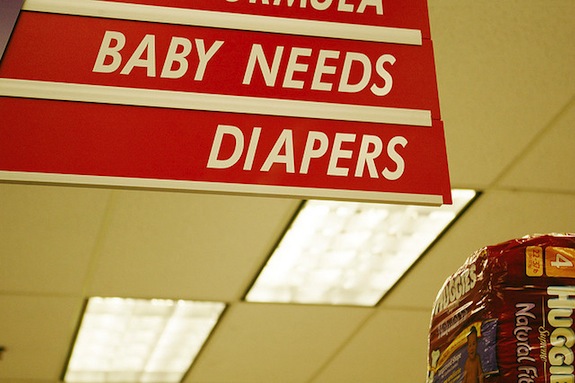One in Three Low-Income Moms Struggle to Afford Diapers
One in twelve will stretch their diaper supplies, leaving babies in soiled diapers for longer than they should

Image: Jonathan Harford
It’s no shock that the economy in the United States has been better. But some of the effects of the increasingly difficult times hit those least able to handle them. According to a study in the journal Pediatrics, one in three low-income families with young babies have difficulty affording diapers for their kids. One in twelve will stretch their diaper supplies, leaving babies in soiled diapers for longer than they should.
Leaving babies in dirty diapers is more than just unhygienic. The researchers behind the study told HealthDay that the families that this kind of stress can cascade down the line:
“There are cases sometimes where moms are taking off a diaper, scooping out what’s in it and putting it back on a child, we’ve heard about that,” said study author Megan Smith, a Yale psychiatrist who directs the New Haven Mental Health Outreach for Mothers Partnership.
“Obviously, then, children are going to show more signs of irritation, discomfort, crying and then this in turn would make the mother feel less adequate about her parenting abilities, impact her depressive symptoms and her stress levels,” Smith said.
And many daycare places require parents to bring their own diapers for their children, a Catch-22 of sorts that leaves mothers without a place to send their children so they can work to make enough money to afford diapers.
Diapers aren’t cheap, either. Enough diapers to keep a baby clean can cost $18 a week, which can be 6 percent of a woman’s pay. And food stamps and other family assistance programs often don’t cover diapers. The Los Angeles Times leads their story on the study with anecdotes of mothers going without food to buy diapers and stealing them from stores. Switching to reusable diapers isn’t a solution either, because many of the women in the study didn’t have washers in their homes, and laundromats discourage women from washing diapers in communal machines. In some places, there are diaper banks and donation programs, but they often can’t keep up with demand.
The study also found that mothers who have a hard time affording diapers are more likely to suffer from depression and anxiety. Many women are unlikely to volunteer to their doctors that they can’t afford diapers, so the researchers suggest that pediatricians ask their patients about their diaper needs and try to help point them to the diaper distribution services that exist.
More from Smithsonian.com:
/https://tf-cmsv2-smithsonianmag-media.s3.amazonaws.com/accounts/headshot/Rose-Eveleth-240.jpg)
/https://tf-cmsv2-smithsonianmag-media.s3.amazonaws.com/accounts/headshot/Rose-Eveleth-240.jpg)